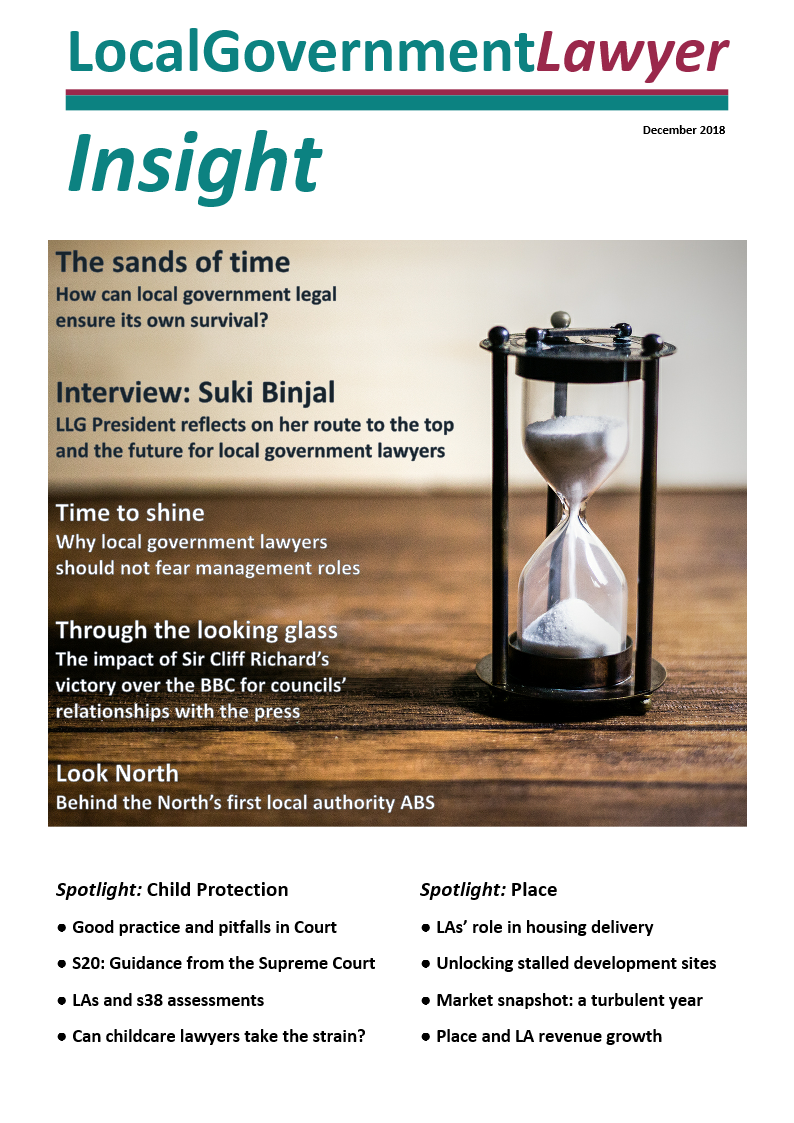Running out of time?
- Details

Austerity has left authorities with a severe shortage of senior lawyers while a dearth of trainees and NQs is failing to swell the junior ranks. Neasa MacErlean assesses what can be done to close the gap.
Is there a crisis brewing in the legal departments of local government? Or, more specifically, will there be enough lawyers in future to carry out the work demanded of them? And are we running out of leaders to direct these legal teams?
Calculations from Local Government Lawyer suggest that current ranks of lawyers would need to work to 77 (see box) in order to maintain present numbers. But even this unlikely prospect would not resolve the difficulties.
| Number crunching
How the figures stack up:
Source of statistics: Law Society of England and Wales |
Suki Binjal, President of Lawyers in Local Government (LLG) is particularly worried about the higher tiers. "There is a real shortage of 5 years plus qualifieds," she says. "These would be the heads of law and monitoring officers of the future. That really is a huge issue nationally." Hannah Cottam, a Director of Sellick, the largest local government locum recruiter, echoes Binjal's views: "There is a real gap at the top of the tree - of the young, dynamic, energetic leaders of the future. There is going to be a crisis at the top in the next five to 10 years."
And Noel Inge, managing director of CILEx Law School (part of the Chartered Institute of Legal Executives) paints the picture somewhat more broadly: "There is insufficient staffing to do the work in local authorities. At every authority I visit they say they are absolutely stretched for resources."
So acute are shortages now, in fact, that Sellick estimates it is seeing a 20% increase in demand for locum placements. The problem is particularly acute in certain areas. The three sectors that are most affected are, according to Sellick, childcare; contract; and, particularly in the south east, housing including debt recovery. Discussing childcare, Cottam says: "Historically councils paid whatever was needed. Now, because of the funding crisis, they can't offer big money anymore."
Supply and demand
One of the reasons for the current dearth of experienced mid-level lawyers in the profession has been the gradual drying up of new talent coming in at the bottom in the form of trainee solicitors.
Binjal remembers the days when local councils "used to have two or three trainees". But the post-2007 funding cuts changed that, and many authorities stopped trainee recruitment completely. Back at the start of this decade, the flow of annual traineeship registrations dipped so low that lawyers would need to have worked well beyond their life expectancy (to age 89) to maintain numbers.
Nowadays, those LAs which do recruit a trainee lawyer generally stick at one. But, in contrast with private practice, councils tend to let them go when they qualify. It remains an uphill task to persuade peers in HR and Finance of the value of retaining newly-qualifieds.
Jill Coule, who has just transferred from the Metropolitan Borough of Sefton to take up the position of Chief Legal & Monitoring Officer at the Liverpool City Region Combined Authority, is distinctly concerned. "The letting go of trainees is a real issue," she says. "I have let high quality newly-qualified solicitors walk out the door at the end of their training contract.
"Unless a vacancy coincides with a trainee solicitor departure/end of training contract, it's very difficult to keep hold of trainees that become super numeri to your staffing structure at the point of qualification? It does, therefore, mean that you don't get more of the benefit of the investment that you, your staff and the organisation have made to the trainees."
Rise of the machines?
So what can local authorities do if they struggle to push up recruitment numbers? AI (Artificial Intelligence) is another partial solution. "It would release lawyers to do more specialist work," says Binjal. "A lot of our work is routine which eventually could be picked up by AI. Most of the City firms have introduced it. There are huge areas where it could be used."
| Case study: Shamsher Zada
Shamsher Zada is used to hearing the idea expressed that "local government lawyers might be frowned upon". Just two years out of training, he organises training and networking events for Junior Professionals nationally as part of his role at Lawyers in Local Government. "A question is almost always asked at each event," he says. "There is something of an ethos expressed that you're not as good as a City lawyer." But the 28-year old clearly does not agree. Doing his training contract at Sandwell Metropolitan Borough Council in the West Midlands meant that he could stay near his family home. "It was more practical for me, and cheaper and meant that I could save," he said. And, yes, he is aware that newly-qualifieds in the most competitive US firms in London earn over £140,000 while a NQ in local government earns nearer £30,000 - £35,000. "In London, especially with the cost of living, you'd be expecting to earn more. And even when you take out the higher travel and accommodation costs, there would still be a differential." In local government, there are several very attractive benefits which compensate, he says - the pension, flexible working (in which you can take days off by building up overtime) and holidays (25 days a year for him now, but with the prospect of rising to 34 in the years to come). But what really interests him is the variety of work in the town halls. "I didn't want to be a lawyer working in just one area," he says, pointing out how often that happens in private practice. "As a trainee in local government, the variety of work is so wide - and I wanted knowledge of lots of areas." In his two years at Sandwell, he worked in litigation (including prosecutions), regulatory, employment, contract & procurement, property and - to his great pleasure - governance. Because he enjoyed governance so much, a new area for him, he studied to gain accreditation in it. He is now working as a Solicitor at the City of Wolverhampton. Many trainees move on after qualifying, he says - partly because budget cuts might not mean there is money to employ them at that stage. But it is also easier in many cases, he adds, to be seen as a qualified solicitor - rather than as an ex-trainee - in a new environment. Talking about life before and after qualifying, he says: "As a local government lawyer, you work on certain projects and then you see them in action. You see how people and the community benefit from them. It's very rewarding." He particularly enjoys contract and procurement and governance but would also be happy if in future he ended up working in other areas instead. And he thinks that future trainees might be given more attractive financial terms. he says. "Local authorities are becoming more commercial. If they want to attract the right talent, they might offer an attractive salary." |
However, local government has not been a fast adopter - and Tanya Corsie of Iken predicts that even the most pioneering local government "disrupters" are "a year or two" away from transition. Corsie is the Chief Operating Officer at Iken, the case and matter management IT specialist. The first step towards exploiting AI usually comes through accessing the Cloud. But Corsie says: "Cloud has been a lot slower to take off in local government than we had anticipated. Very few local authorities have transitioned their entire IT estate into a Cloud platform." Not even a quarter (22%) of local authorities are "actively moving" applications or infrastructures to the Cloud, according to research used by Iken.
In the meantime, local government is particularly focused on the recruitment of chartered legal executives and paralegals. "Local government is becoming more open-minded about recruiting people from different backgrounds," says Cottam. And Binjal says: "There is a reduced demand for trainee solicitors but we are meeting the demand with paralegals - and that reduces the cost."
About 40 local authorities are using apprenticeships to train paralegals and chartered legal executives through the CILEx Law School. It is difficult to predict precisely how these numbers might change since both CILEx and the SRA (Solicitors Regulation Authority) are reviewing their professional qualifications. Nonetheless, paralegal apprenticeships are becoming better understood while chartered legal executive apprenticeships, which only started in September 2017, have attracted the interest of several authorities.
Of the 40 authorities now working with the CILEx Law School, eight are city authorities, 27 are boroughs, four are counties and there is one shared services venture. Inge explains some of the attractions for these employers: "Local authorities like paralegals because they can use a fixed term contract for two years. It should be the intention of the authority to keep the person on after but it is not mandatory…. Local government employers are often unaware that they can use the 'Apprenticeship Levy' [using 0.5% tax relief on pay bills over £3m] to pay training fees for existing employees through an apprenticeship. That will help them meet the government's target of at least 2.3% of the workforce in public sector bodies being apprentices by 2020."
Looking at the more practical issues of employing a trainee paralegal, Inge says: "Getting an apprentice adds firepower to a local authority's legal team. But when someone starts off they do require a lot of supervision. You have the dis-benefit of training them for the first few months. But our research suggests that after nine to 12 months they work much more independently."
He acknowledges that the difficulty for councils now is "finding the salary" for these trainees but he is confident that numbers will expand. He expects that more local authorities will follow the example of the leaders when they see the results. He says: "Some authorities are very far-sighted and quick to adapt the apprenticeship scheme into their workplace plans."
LLG has its own initiatives in the planning. Agreed in the first half of 2018 by discussions at board level, the development of a "new suite of tools" will be one of the main projects that LLG's new (and first) chief executive Deborah Evans will be working on, according to Binjal. "We will be looking at the gap in the market, particularly in the middle years, to see what we can do." Focusing especially on the 5 years+ qualified sector, LLG wants to build "succession and resilience". Binjal talks of a range of areas of focus - "to build mentoring, secondments and career breaks; to work with the private sector; to have more collaboration".
Binjal hopes that the proposals will be ready "by about March 2019". She explains the underlying theme: "I advocate training your own people. So we should continue to offer training contracts. But it's in the middle that there are gaps: people retire and haven't built a succession plan. It's a national issue. We are losing people to the private sector, central government, health and industry - although some do a zig zag, and then come back to local government. But we haven't built a sustainable business model and we need to do that. We need to communicate that to local government chief executives and other stakeholders."
A broadening of the mind for recruiters and finance teams will also have to be part of the new approach. It will include people working longer but rarely to 77 (or 89). Speaking personally, Binjal says: "Looking at different flexible models of working is vital. So, for example, I will still carry on working two-to-three days per week until I am about 70. But we have to think about how we use experienced members of an organisation." Coule, who has already clocked up 24 years, probably speaks for many when she says: "I personally have no plans to work until 77!"
Exchanges and closer collaboration with the private sector will play a part in LLG thinking. Law firm Browne Jacobson and NWL Legal Focus (the Legal Services Team at North West Leicestershire District Council) launched a partnership on education in 2016. This might stand as a model for the future - although, in this case, not a great deal of joint working is taking place now.
But Coule is keen that lawyers from private practice contribute their different perspectives within the public sector. At Sefton, Coule's six-strong senior legal management team was equally split between lawyers who had trained in the private and public sectors. She says: "It's important to have a balance of staff that can bring skills, knowledge and ways of working that are different to your own so that you have a more rounded and professional legal team." (Continues below)
|
Case Study - Sonny Groom If he had chosen another path in life, Sonny Groom would now be starting out his career with over £40,000 of debts. But, having decided not to go to university, the 22-year old believes he has found what is "probably the best way forward" in the law for non-graduates. As a paralegal apprentice, he works in the legal team at the London Borough of Barking and Dagenham, spending a fifth of his time on the paralegal distance learning course run by the Chartered Institute of Legal Executives. A year into the two-year course, he has already worked in Housing, Property, Contracts, Adults safeguarding and (now) Children's Safeguarding. He can draft a range of documents including letters of instruction and police protocol requests. He prepares court bundles. He learnt these skills mainly through on-the-job learning, backed up by the study - a module on client care, for instance, which includes client communication. "I've been given more and more responsibility as time has gone on," he says, explaining what he enjoys about his work life. "I'm working for our clients. The days go quite quickly." But four years ago his developing CV was not pointing towards the law. When he left his Dagenham school, he had a triple science BTEC (the equivalent of A levels). After visits to the Job Centre and Job Shop he had his choice of eight different career starts. He chose an apprenticeship route into Business Administration within the legal team at Barking and Dagenham Council. When he completed that he decided to specialise in the legal side, rather than staying within legal admin. Every Monday afternoon - and also for two other two-hour slots each week - he takes his lap top away from his desk to go "somewhere quieter" in order to study. The borough pays the course fees to the Institute." I get the opportunity to do the legal work and then the studying allows me to put it in context." He is particularly looking forward to the chance he will get to work in litigation. If he had to bet on it now, he thinks this is where he would like to end up. "They always seem to be busy with different businesses and diverse cases," he says. |
And Cottam says she sees a regular flow of lawyers leaving mid-tier firms and the High Street for local government. It might not represent more than one in 20 candidates but it is a recognisable trend. Some are burnt out by stress, some "feel they are like machines" and others say "there isn't enough career progression". Local government salaries may be dwarfed by the £143,000 offered to newly-qualifieds by some firms in the City of London but the City burn-out cases "are no longer just wanting money", she adds.
But despite the current challenges, there are some fundamental attractions to working in local government which will still draw candidates. Helen McGrath, policy and communications manager at LLG, lists some of them - "very good equality, flexible working, excellent benefits and much greater sympathy to personal obligations".
On work/life balance - an area which used to be better in local government - she gives a qualified opinion: "Fifteen years ago local government lawyers could do 9 to 5. But in 2007 and afterwards there were major changes and cutbacks. And now it's not uncommon for local authority lawyers to be putting in a huge number of hours."
The pension is another reason that candidates consider local authorities. The Local Government Pension Scheme is listed as one of the top ten by Moneywise which gives the example of a 40-yer old town planner [who could be a lawyer instead] earning £40,000 and who "can look forward to an annual income of around £29,500 if they retire at age 65". By contrast, the average person retiring in 2018 will receive about a third less - £19,900 a year, according to the Prudential.
So if local authority employers could manage to become more flexible and efficient in their hiring and training strategies, they could find that they already have the tools to solve their recruitment challenges.
Neasa MacErlean is a freelance journalist

This article was first published in the December 2018 edition of Local Government Lawyer Insight, which can be accessed at http://www.localgovernmentlawyer.co.uk/insight Insight is published four times a year and is circulated free-of-charge to all Local Government Lawyer newsletter subscribers (click here to subscribe) in electronic format. A single hard copy is also circulated to all local authority legal departments in England and Wales. Also in this issue: Sands of time Interview: Suki Binjal Time to shine Through the looking glass Look North Spotlight: Child Protection
Spotlight: Place
|
Deputy Director Legal and Democratic Services
Regulatory/Litigation Lawyer
Legal Adviser
Contracts Lawyer
Antisocial Behaviour Legal Officer
Legal Director - Government and Public Sector
Lawyer (Planning and Regulatory)
Governance Lawyer
Locum roles
 Masterclass – Mental Health Act – Legal Update - Peter Edwards Law Training
Masterclass – Mental Health Act – Legal Update - Peter Edwards Law Training
17-12-2025
Online (live)
 Masterclass – MCA and Court of Protection - Legal Update - Peter Edwards Law Training
Masterclass – MCA and Court of Protection - Legal Update - Peter Edwards Law Training
21-01-2026
Online (live)
 Managing settlements: the legal and practical issues, and the pitfalls to avoid - Blake Morgan
Managing settlements: the legal and practical issues, and the pitfalls to avoid - Blake Morgan
22-01-2026 10:00 am
Online (live)
 Children and Young People (DoL, Competency and Capacity) - Peter Edwards Law Training
Children and Young People (DoL, Competency and Capacity) - Peter Edwards Law Training
28-01-2026
Online (live)
 HMPL Building Blocks: Legal Tools to Combat Anti-Social Behaviour - Devonshires
HMPL Building Blocks: Legal Tools to Combat Anti-Social Behaviour - Devonshires
17-02-2026
Online (live)
 Freedom of thought, belief and religion: Article 9 ECHR - Francis Taylor Building
Freedom of thought, belief and religion: Article 9 ECHR - Francis Taylor Building
19-02-2026
Online (live)
 Grappling with S73 - variations of conditions applications or appeals - Ivy Legal
Grappling with S73 - variations of conditions applications or appeals - Ivy Legal
09-03-2026
Online (live)
 HMPL Building Blocks: Tenancy Management – Assignment, Mutual Exchange and Succession - Devonshires
HMPL Building Blocks: Tenancy Management – Assignment, Mutual Exchange and Succession - Devonshires
12-03-2026
Online (live)
 Section 31(2A) Senior Courts Act: where have we got to? - Francis Taylor Building
Section 31(2A) Senior Courts Act: where have we got to? - Francis Taylor Building
18-03-2026 1:00 pm
Online (live)
 Save the Date: The Law of Public Rights of Way, Commons and Town or Village Greens Seminar (Hybrid) - Francis Taylor Building
Save the Date: The Law of Public Rights of Way, Commons and Town or Village Greens Seminar (Hybrid) - Francis Taylor Building
25-03-2026
London
 HMPL Building Blocks: A Housing Officer’s Guide to Court Proceedings - Devonshires
HMPL Building Blocks: A Housing Officer’s Guide to Court Proceedings - Devonshires
14-04-2026
Online (live)
 HMPL Building Blocks: Leasehold Management – Managing the Managing Agents - Devonshires
HMPL Building Blocks: Leasehold Management – Managing the Managing Agents - Devonshires
21-05-2026
Online (live)
 Unpicking the Procurement Act Episode 2: Exclusion and Debarment - 39 Essex Chambers
Unpicking the Procurement Act Episode 2: Exclusion and Debarment - 39 Essex Chambers
On Demand
Online (pre-recorded)
 Level 2 Award in Customer Service for Social Housing (RQF) - LBL Skills
Level 2 Award in Customer Service for Social Housing (RQF) - LBL Skills
On Demand
Online (pre-recorded)
 Unpicking the Procurement Act Episode 1: Overview and New Procedures - 39 Essex Chambers
Unpicking the Procurement Act Episode 1: Overview and New Procedures - 39 Essex Chambers
On Demand
Online (pre-recorded)
































































































 Capsticks Housing Diploma
Capsticks Housing Diploma  Building Safety Act Conference 2026 - Landmark Chambers
Building Safety Act Conference 2026 - Landmark Chambers  Education Law Conference - 3PB
Education Law Conference - 3PB  Annual Planning Seminar 2026 - No.5 Barristers
Annual Planning Seminar 2026 - No.5 Barristers  Ivy Legal - Certificate in Planning Enforcement
Ivy Legal - Certificate in Planning Enforcement 